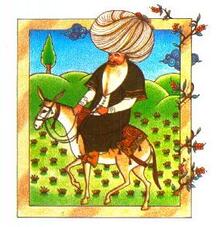
There is nothing new in the world but to a newborn, all stories are new. For the newcomer to Nasreddin Hodja, the 111 stories that follow promise a discovery. As for Nasreddin’s old friends, they are a modest aide-mémoire.
This booklet was mainly written for my imaginary grand children. I collected the traditional Hodja fables under this title because, to advise or teach, I do not like to tell one directly how to think or what to do. Instead, almost everything “reminds me of a story”. Often, it is a Nasreddin story.
As I am a shameless thief of wisdom, my last concern is to be original. Of late, I care to scatter some good seed on the footpath, not to boast as when I was young: “Me! Me! Me!” These stories belong to the wisdom treasury of the world, they were told for centuries and only this narration is mine. I worked hard to rewrite the folkloric gems in my own words, in this language which is not my mother tongue, in order to avoid the tyranny of other people’s copyrights. I want everyone to enjoy freely - as all knowledge should be - an honest personal selection from the Nasreddin treasury, careful to bring back astute ideas often lost in the “joke” variants so abundant on the Net and in the chap-printings.
I re-tell the Nasreddin tales from the point of view of Western civilisation willing to learn some subtlety from the East. I hope that such rendering builds bridges among cultures in times when mutual understanding and respect are rather wanting.
As you will find in innumerable sources, Nasreddin the Hodja or Hoça or the Mullah was born in Turkey but also in many other countries of the East. His mule was – and still is - loaded with many hundreds of stories of disparate kinds and origins: Turkish, Jewish, Persian, Indian and Afghan, even Chinese. The Balkans, North Africa and Asia swarm with avatars of Nasreddin. At present, European and American stories also claim their place in the Nasreddin treasury of wit. At times, in my turn, I made the mullah's mule carry stories from other traditions, in all good faith, because of their "family resemblance"; today the Hodja stories are, I am convinced, a living folklore of the World. And tell me, who is forbidden to contribute to folklore?
Over centuries, people imagined the Nasreddin that fitted their needs and fancy. There are sage Sufi-flavoured Mullahs that teach us esoteric wisdom and stupid Effendis that make the stupid feel clever. There are bold subversive Hoças ridiculing tyranny and fanaticism at the whiskers of the tiger and, if one likes so, sheepish little nasruddins ready to sell their soul (as my late much-loved dogs Tao or Gad would have done) for a plate of mutton. Some people even enjoy a paedophile Hoça, the scatological Hoça, or an evil, idiotic, “Beavis and Butthead”– like Nasreddin. You will find those collector items in “complete” academic anthologies but certainly not here. We have the right to select.
My chosen Hodja is wise and bright, maybe somewhat cynical - it is the downside of experience - but he is certainly a good, caring person. He is a close parent of Birbal of India, Till Eulenspiegel of the Low Countries or Ludas Matyi of Hungary. He lived long years under tyranny and his wisdom is the one of the intellectual subverting oppression while surviving under it. He can bite, if needed. He would play the fool and make a fool out of himself if that is the price, to make other people discover how silly they are, but he is no fool. He is a sage worth listening to. So I hope...
There are good reasons to use Nasreddin fables for teaching: The attention-grabbing anecdotes of the Mullah make us learn as children learn – from examples; the unquestioned common places used as arguments cause us to absorb paradoxes without resistance. Once assimilated, the dissonance provokes minds to open. How is this possible ? Nasreddin’s intuitive playing with obviousness, slippery words and challenge is ceaselessly testing the top, the borders and the bottom of everyday thinking. He reveals received ideas and exposes the nonsense we utter everyday.
In my opinion, these stories smuggle a crash course in critical thinking. And critical thinking means freedom to think with your own head, more choices in the mind. This makes a big difference in one's life…
Such innocent looking stories are deeper than amusement; as you leaf through this booklet, it assays you: you go on reading or you lose interest. If you choose to read the whole book, it reads you in its turn: What you understand, depends on who you are but you absorb its metaphors and its turns of mind. In the end, once familiar with the stories, you cannot unknow them any more. You may even be somewhat changed.
Ioan Tenner 2007 - 2017
 RSS Feed
RSS Feed